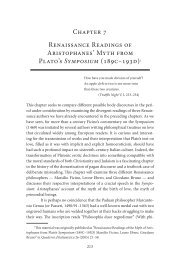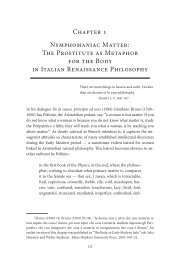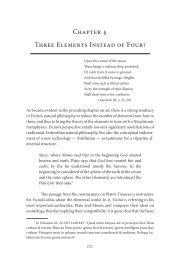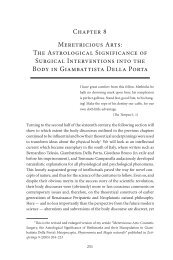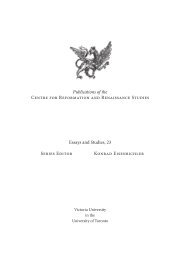Chapter 2 Matter as a Mirror: Marsilio Ficino and Renaissance ...
Chapter 2 Matter as a Mirror: Marsilio Ficino and Renaissance ...
Chapter 2 Matter as a Mirror: Marsilio Ficino and Renaissance ...
You also want an ePaper? Increase the reach of your titles
YUMPU automatically turns print PDFs into web optimized ePapers that Google loves.
<strong>Matter</strong> <strong>as</strong> a <strong>Mirror</strong> 75<br />
his integrity: he only gazes at his own image. 87 Irigaray describes the implications<br />
of this Platonic account of parthenogenesis:<br />
Being h<strong>as</strong> nothing that predates it, nor anything ahead that it<br />
should aim for. Everything is already (in) Him. […] Flooding<br />
the universe with the seeds he scatters everywhere. […] Thus,<br />
every “being” […] can only try to mimic God, copy him more<br />
or less well, for there is no other perfection to rely on. […]<br />
There is nothing outside or even behind, that is not subject to<br />
his designs. Everything is enclosed in a super-celestial gaze. 88<br />
In accordance with this, <strong>Ficino</strong> maintains that matter, after being<br />
shaped by the divine glance, represents divine unity according to its own<br />
diminished capacity, in a “shadowy way.” Thus, matter is God’s first creation,<br />
but that is not all: <strong>as</strong> God could have created the universe at any given time,<br />
matter h<strong>as</strong> always existed potentially, <strong>as</strong> the withheld divine gaze, so to speak.<br />
<strong>Ficino</strong> then goes on to say that matter h<strong>as</strong> no definite characteristics whatsoever:<br />
it is neutral <strong>and</strong> malleable <strong>and</strong> can <strong>as</strong>sume any given form. As universal<br />
potentiality, matter is neither inclined towards being (because then it would<br />
not need a higher forming power), nor towards non-being (because then it<br />
would not obey the divine craftsman). The precarious relationship we have<br />
already detected between soul <strong>and</strong> matter is transferred onto the relationship<br />
of God to his shadow: disobedient matter poses an alarming threat to divine<br />
omnipotence. 89 The idea that matter could become such an obstacle to the<br />
divine is a direct result of the Narcissism involved in the process of creation,<br />
which always conveys a solipsist fant<strong>as</strong>y of absolute power that does not tolerate<br />
any opposition.<br />
The evidence of the Theologia platonica is corroborated by <strong>Ficino</strong>’s<br />
Philebus commentary in which the act of creation is again described <strong>as</strong> a Narcissistic<br />
process in which God is mirrored in a shadow, matter, or otherness. 90<br />
87 Actually, <strong>Ficino</strong> is in dire need here of stressing that nothing is given away, <strong>as</strong> the<br />
contrary is true in his theories of vision: see infra.<br />
88 Irigaray (1985) 329.<br />
89 See Plotinus, Enneads, II, 9, 3.<br />
90 <strong>Ficino</strong> (1975) 389: “Ideo communis materies velut umbra quaedam fugientem sequitur<br />
deum. Forma vero in materia velut in speculo ex quodam benefico divini vultus <strong>as</strong>pectu<br />
resultat.” See also <strong>Ficino</strong> (1975) 417: “Therefore universal matter, like some shadow,



